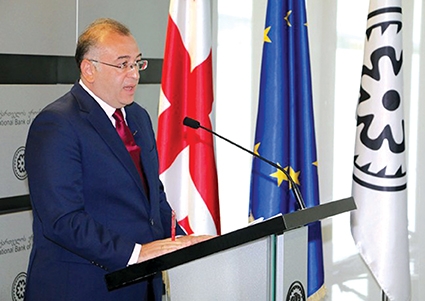NBG Director Presents Main Directions of Monetary & Exchange Rate Policies
The President of the Georgian National Bank (NBG), Koba Gvenetadze, presented Parliament the Main Directions of Monetary and Exchange Rate Policies for 2019-2021, which reflects the target inflation rate, the main instruments of monetary policy that the National Bank will utilize to achieve its target, and the potential risk factors.
In his speech, Gvenetadze underlined the need for a flexible exchange rate regime for the Georgian economy to maintain competitiveness and promote long-term economic growth. He noted the floating exchange rate is characterized by short-term fluctuations which, he claims, absorbs shocks and prevents them from affecting the economy.
"The importance of the flexible exchange rate has been repeatedly confirmed during the past periods of crises based on the experience of other countries in the region. An example of this is the 2014-2015 crisis, when measures were taken to avoid short-term fluctuations in certain countries, but this caused more serious crises in the course of long-term policy. [In Georgia], short-term fluctuations are immediately reflected in the exchange rate and help to prevent the accumulation of risks,” Gvenetadze said.
The NBG Head also talked about the links between inflation and the exchange rate. He said that in Georgia, it is generally believed that the only factor affecting inflation is the exchange rate, but “this is not entirely so.”
“Inflation is more dependent on joint demands and, of course, monetary policy decisions. Today, the National Bank’s Monetary Policy Framework and Tools have been developed to keep inflation low in the future,” he said.
Gvenetadze explained that the inflation in developing countries is higher than it is in developed countries.
“The targeted index of inflation in developed countries is 1-2%, while in developing countries it is within 2-4%,” the NBG Director noted, adding the inflation target rate in Georgia will be 3% in the mid-term.
Gvenetadze also talked about the Currency Reserves of the National Bank, saying they are the most “inadequate” in the region, a fact which needs to be improved.
“Reserves are very important and foreign and rating companies are paying a lot of attention to this. Improvement of this indicator will inevitably lead to improvement of the country's ratings. I think this is a very important issue and the National Bank will continue working in this direction," he added.
The lawmakers approved the Main Directions of Monetary and Exchange Rate Policies for 2019-2021, presented by Gvenetadze at the extraordinary session on December 22.
By Thea Morrison
Image source: bm.ge











